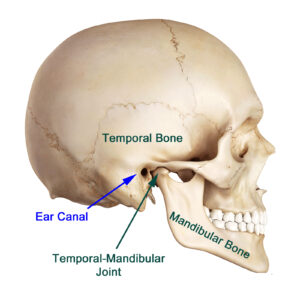[one_full last=”yes” spacing=”yes” center_content=”no” hide_on_mobile=”no” background_color=”” background_image=”” background_repeat=”no-repeat” background_position=”left top” border_position=”all” border_size=”0px” border_color=”” border_style=”” padding=”” margin_top=”” margin_bottom=”” animation_type=”” animation_direction=”” animation_speed=”0.1″ class=”” id=””]
What is the TMJ and what causes TMJ Disorder?
In this blog, we will be going over a disorder that “some estimates suggest that over 10 million Americans are affected” (source: National Institute of Dental and Craniofacial Research) by and that is, TMJ disorders or commonly referred to as “TMD” or “TMJ”.
The temporomandibular joint (TMJ) is the joint that connects the skull to the jaw. It permits the lower jaw to move and function appropriately.
Even with the advancement in research, it is still difficult to pinpoint the exact cause of TMJ. Most of the problems arise from problems with the muscles of the jaw or within the joint itself.
Additionally, injury or trauma to the neck or head, can also lead to TMJ disorder.
Other causes include:
- Grinding or clenching your teeth also known as Bruxism. We will go over this in more detail below.
- Movement or herniation of the soft cushion or disc between the ball and socket of the joint.
- Arthritis in the joint.
- Stress; which can cause you to tighten facial and jaw muscles.
- Sleep apnea has been associated with symptoms related to TMJ.
TMJ Disorder Symptoms
TMJ disorder will often cause severe pain or discomfort. It can be temporary or last for many years. It might affect one or both sides of your face. Other symptoms may include:
- Tenderness of your jaw
- Jaw pain
- Aching pain in and around your ear
- Difficulty chewing and/or pain while chewing.
- Aching facial pain
- Tight or stiff jaw muscles
- Clicking, popping or grinding sounds inside your jaw joints
- Headaches
- Limited opening or movement of the lower jaw
[/one_full][one_full last=”yes” spacing=”yes” center_content=”no” hide_on_mobile=”no” background_color=”” background_image=”” background_repeat=”no-repeat” background_position=”left top” border_position=”all” border_size=”0px” border_color=”” border_style=”” padding=”” margin_top=”” margin_bottom=”” animation_type=”” animation_direction=”” animation_speed=”0.1″ class=”” id=””]
TMJ Diagnosis
There is no specific test to diagnose TMJ disorder. Taking the patient’s medical history and doing a physical exam will help the doctor to determine the cause of the symptoms. Additionally, to help evaluate the jaw joints, the doctors may perform additional tests such as X-rays, CT scans or MRI’s. The Doctors at Chicago Beautiful Smiles are experienced in diagnosing and treating TMJ disorders. Please refer to the video. [/one_full][one_half last=”no” spacing=”yes” center_content=”no” hide_on_mobile=”no” background_color=”” background_image=”” background_repeat=”no-repeat” background_position=”left top” border_position=”all” border_size=”0px” border_color=”” border_style=”solid” padding=”” margin_top=”” margin_bottom=”” animation_type=”0″ animation_direction=”down” animation_speed=”0.1″ class=”” id=””][youtube id=”ci0fVS2jHHY” width=”600″ height=”350″ autoplay=”no” api_params=”” class=””][/youtube][/one_half][one_half last=”yes” spacing=”yes” center_content=”no” hide_on_mobile=”no” background_color=”” background_image=”” background_repeat=”no-repeat” background_position=”left top” border_position=”all” border_size=”0px” border_color=”” border_style=”” padding=”” margin_top=”” margin_bottom=”” animation_type=”” animation_direction=”” animation_speed=”0.1″ class=”” id=””][youtube id=”D3GRVr3pqac” width=”600″ height=”350″ autoplay=”no” api_params=”” class=””][/youtube][/one_half][one_full last=”yes” spacing=”yes” center_content=”no” hide_on_mobile=”no” background_color=”” background_image=”” background_repeat=”no-repeat” background_position=”left top” border_position=”all” border_size=”0px” border_color=”” border_style=”” padding=”” margin_top=”” margin_bottom=”” animation_type=”” animation_direction=”” animation_speed=”0.1″ class=”” id=””]
TMJ Treatment
In some cases, the symptoms of TMJ may go away in some time without treatment. Though, if the symptoms persist, there are a variety of treatment options.
Medications
In most cases, medication options will help alleviate the pain associated with TMJ disorder but may not fully treat it.
- Pain relievers and anti-inflammatories: Over-the-counter medications are typically used to relieve the pain. Only in specific acute situations, the doctor may prescribe stronger pain relievers.
- Muscle relaxants: these can be used to greatly alleviate the pain for a few days or weeks.
Therapies
Nondrug therapies include two options.
- Oral splints, also known as night guards, are typically the most common form of treatment. Oral splints are custom-made dental appliances that fit on either your upper or lower teeth. These help alleviate the pressure of the joints of your jaw and the muscles surrounding the jaw. With reduced pressure, the joints and muscles in the area can relax and therefore reduce soreness. Moreover, oral splints make it more difficult for you to grind or clench your teeth which can be a main cause of TMJ disorder.
- Physical Therapy: this type of treatment includes ultrasound, heat and ice packs, coupled with exercises to strengthen and stretch jaw muscles.
Surgical Procedures
If none of the previous suggested methods work, the doctor might suggest surgical procedures like:
- Arthrocentesis: this is a minimally invasive procedure that consists of injecting small needles into the joint so that fluid can be irrigated through the joint to remove excess, debris and inflammatory byproducts. More information about other surgical procedures can be found here (http://www.tmj.org/site/content/surgical-management-temporomandibular-disorders-fact-or-fallacy)
TMJ vs Bruxism
TMJ disorder and Bruxism are two different conditions that are often used interchangeably. We just went over TMJ disorder and now we will explain Bruxism very briefly. Bruxism is the involuntary or habitual grinding or clenching the teeth. Usually, this occurs at night but it can also occur during the day in more extreme cases. Symptoms include, but are not limited to:
- Headaches
- Jaw pain
- Mouth pain
- Teeth sensitivity
- Abnormal teeth wear and chipped teeth
Among the causes of bruxism, are:
- Sleep apnea
- Stress or anxiety
- Diet
- Misalignment of the teeth
As you can see, some of the symptoms and causes of Bruxism are very similar to the symptoms of TMJ disorder. Here’s a simple table that summarizes TMJ vs Bruxism.
| Bruxism | TMJ Dysfunction | |
| Is a behavior? | Yes | No |
| Is one distinct condition? | Yes | No |
| Is caused by another condition? | Sometimes | Yes |
| Can be treated with a night guard? | Yes | Yes |
One important thing to remember is that bruxism can be caused by TMD, but bruxism can in turn also cause or worsen TMD.
If you experience any of the symptoms cited above, please schedule an appointment with your dentist. For more information about TMJ, please visit our TMJ page and click here to schedule an appointment. [/one_full]


